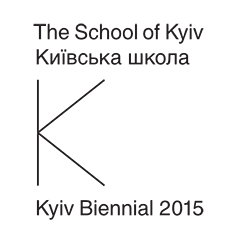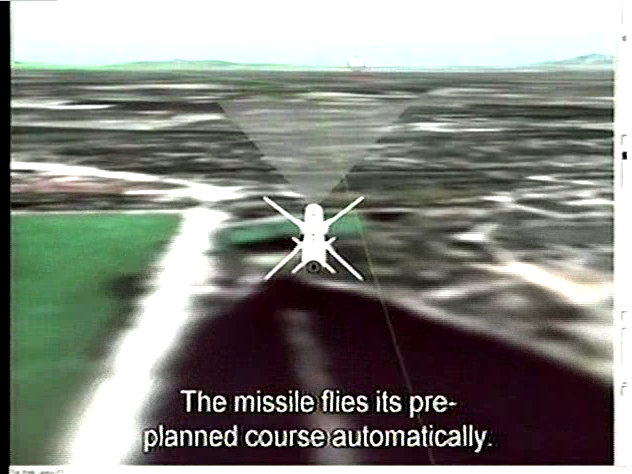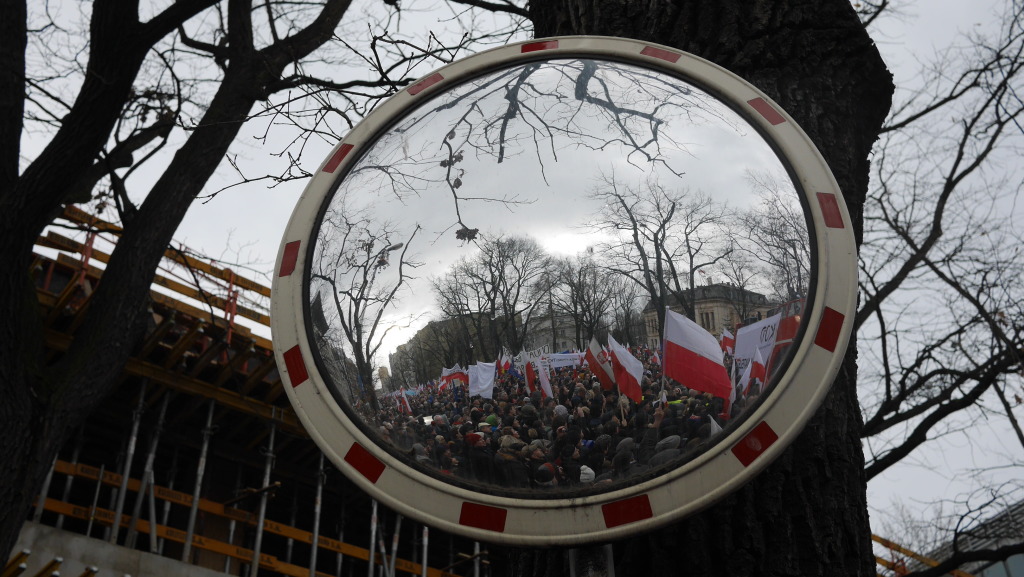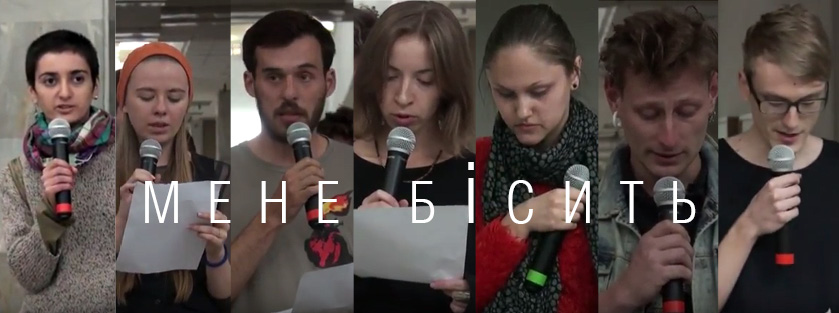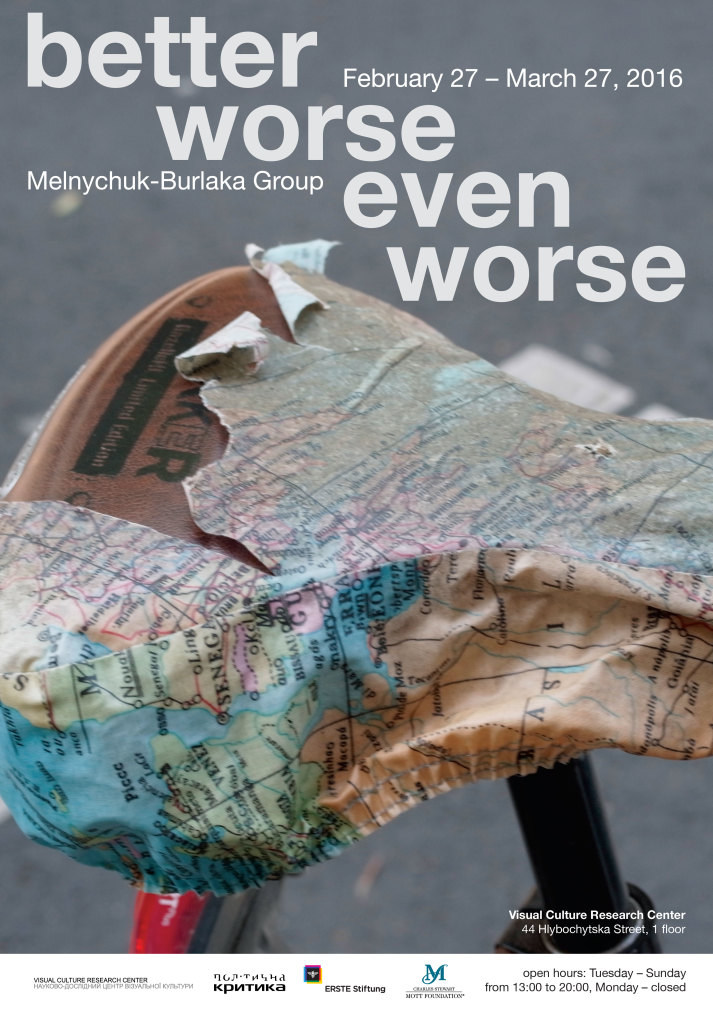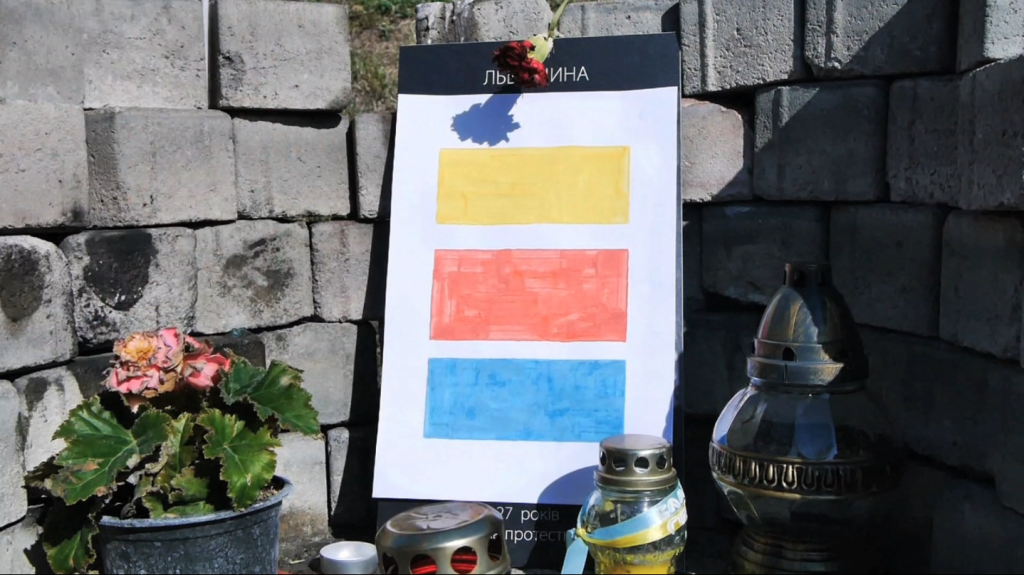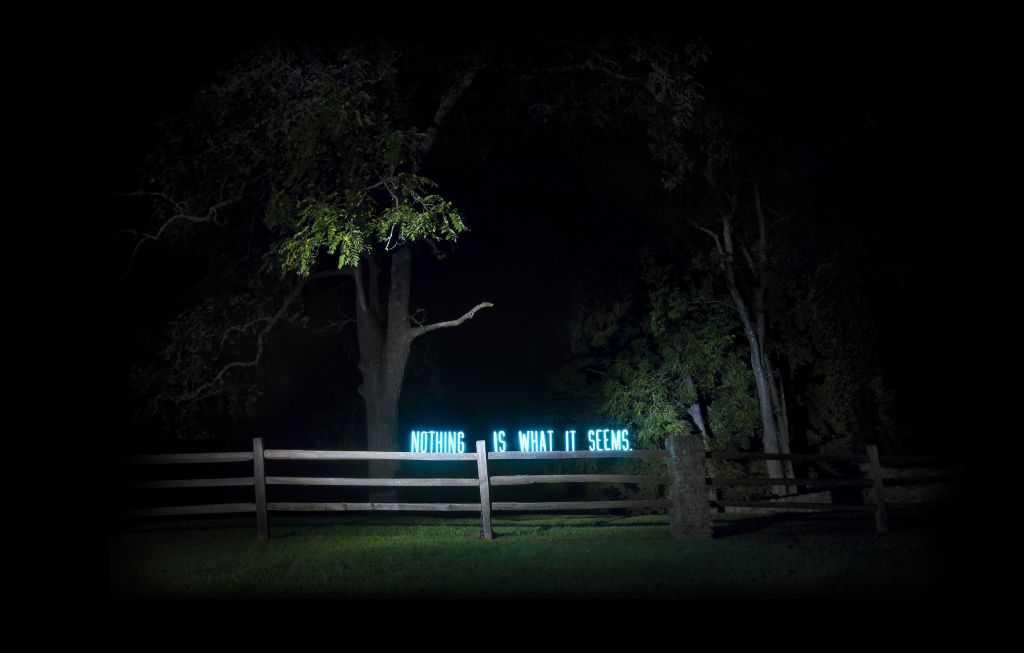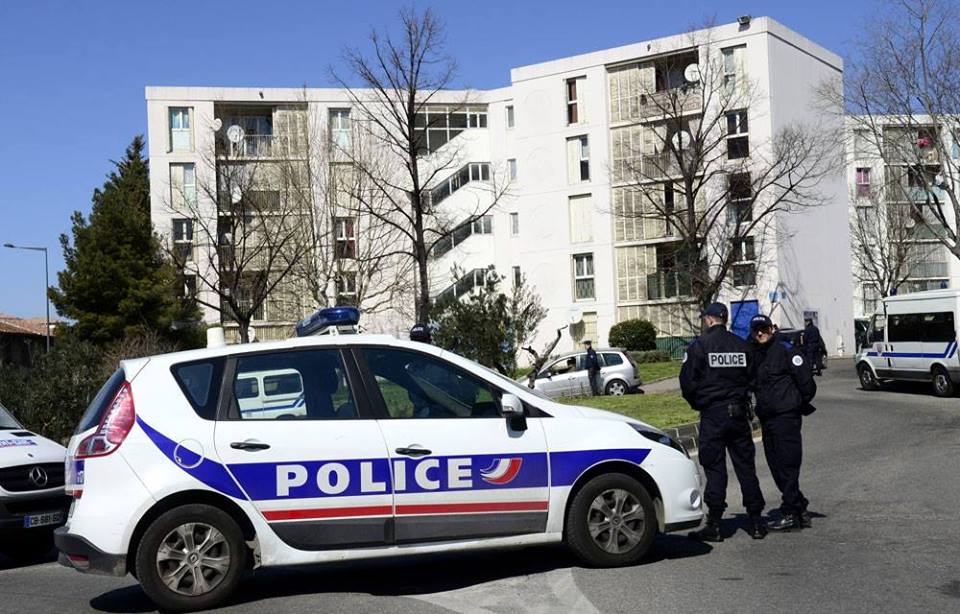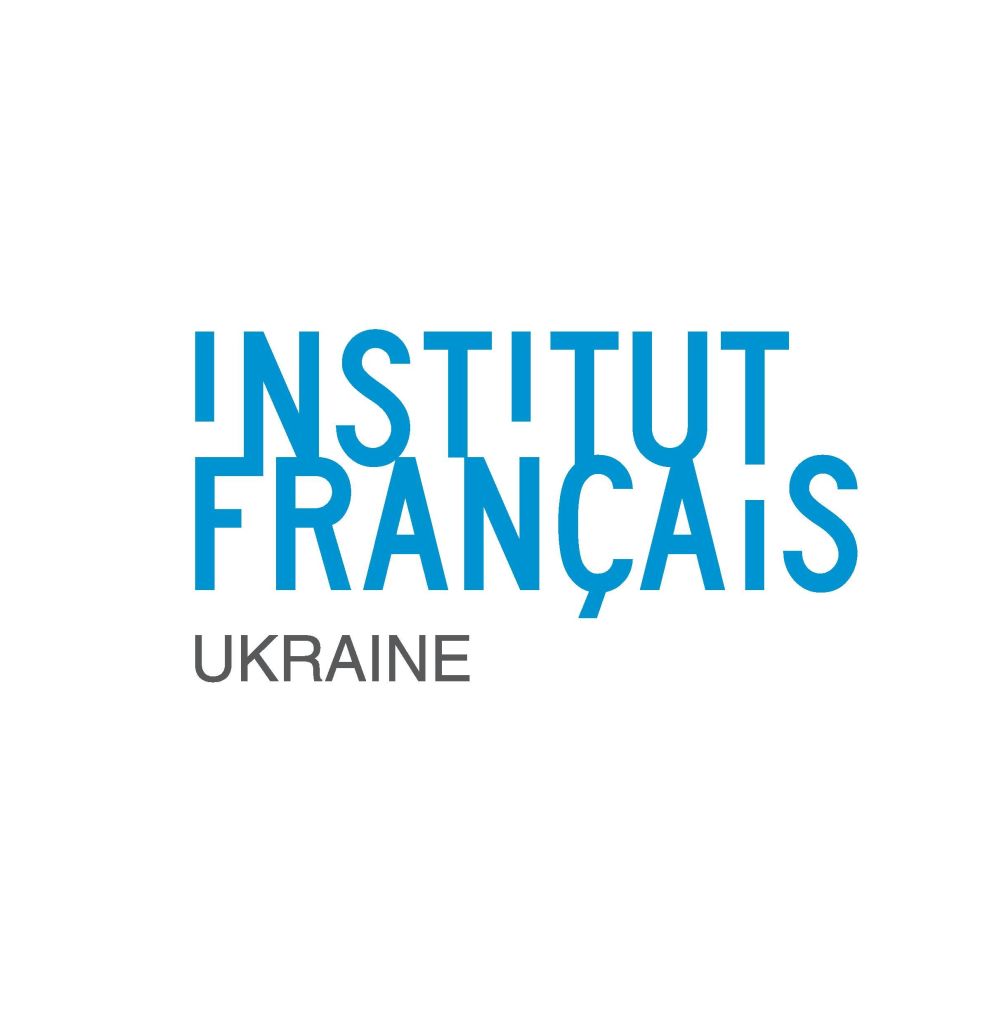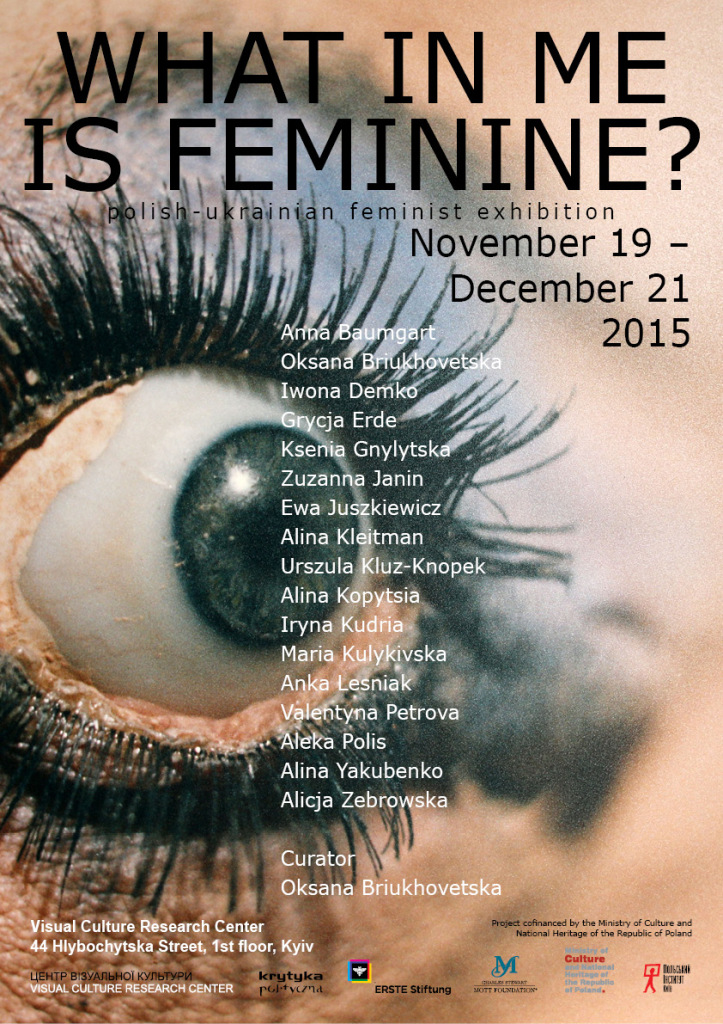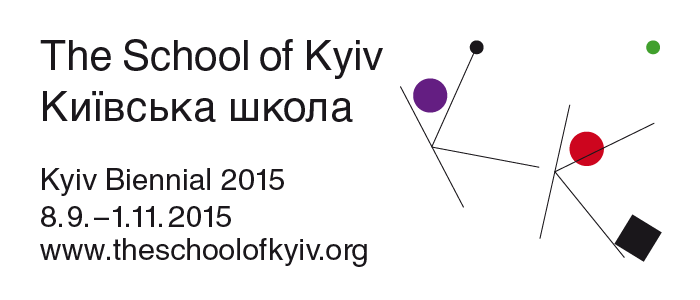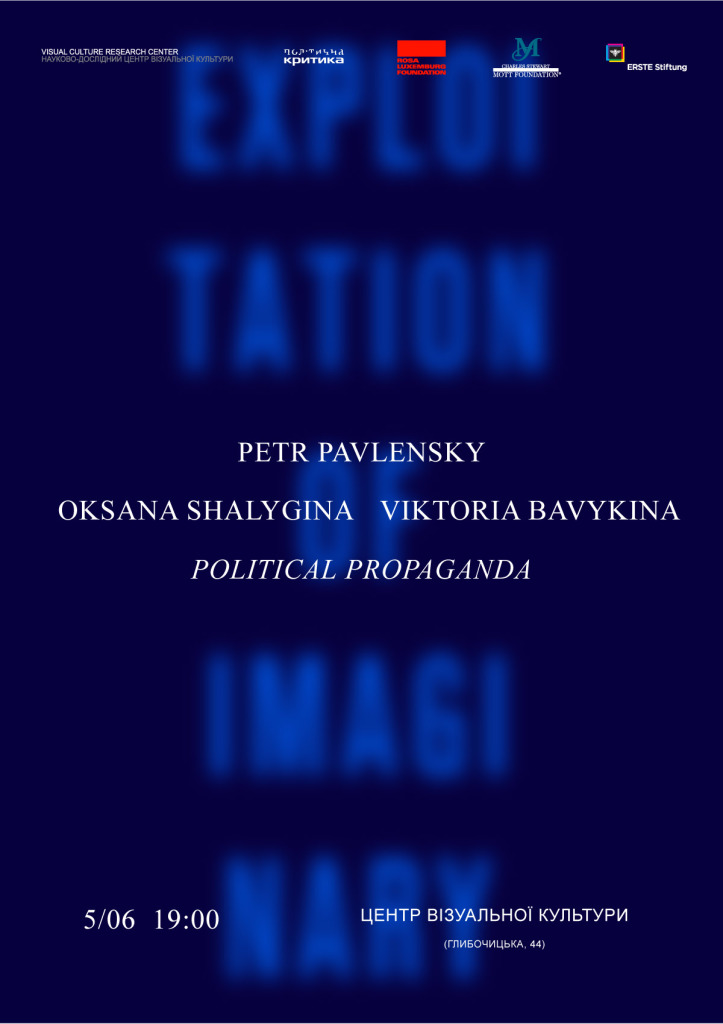Jakub Majmurek. TOWARDS A TOPOLOGY OF ESSAY FILM
Sunday, 20 March 2016, 18:00
Lecture by Jakub Majmurek (Warsaw)
Towards a Topology of Essay Film
Visual Culture Research Center and Political Critique invite to the lecture Towards a Topology of Essay Film by Jakub Majmurek.
In this lecture, Jakub Majmurek will outline a project for a topology of a specific film genre, which is an essay film. Starting from a historical, genealogical perspective, he will define essay film as a heterogenic form, bounded by strongly blurred frontiers. The heterogeneity in question can be found both in the formal aspects of essay films as well as in the range of topics and social contexts that form is taking. Mapping the frontiers of a genre of film essay would be crucial for this topological endeavor. The lecture will describe how essay film – as an artistic practice stemming from a field of cinema – is articulating itself in relation with other fields of social practices. A special emphasis will be put on three social fields – that of politics, that of art (or art-world) and that of science.
Jakub Majmurek is a philosopher, film critic, and political commentator. He regularly contributes to Wirtualna Polska, Krytyka Polityczna and other publications. He is an editor and co-author of numerous publications on topics ranging from political philosophy (among others, L’idée du communisme II) to cinema and contemporary art (most recently – Polish Cine Art).
The lecture will be delivered in English.
Admission is free
Picture: Harun Farocki. War at Distance (2003).
Supported by Ministry of Culture and National Heritage of Poland
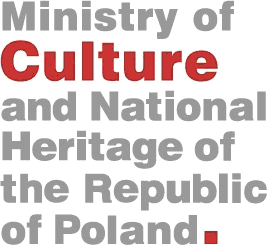
Supported by ERSTE Stiftung та Charles Stewart Mott Foundation:
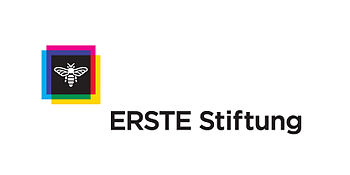
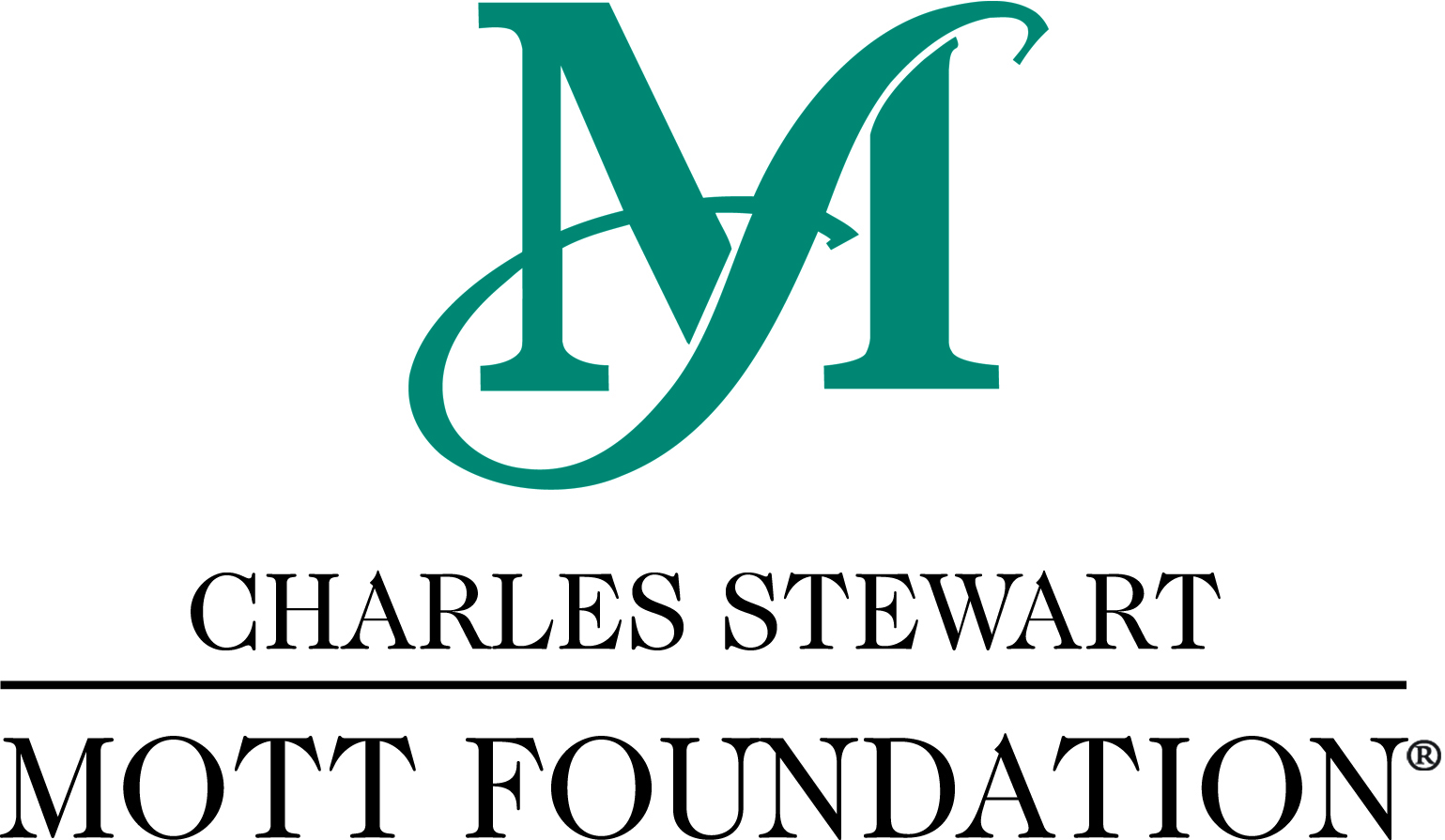
Visual Culture Research Center (VCRC) was founded in 2008 as a platform for collaboration between academic, artistic, and activist communities. VCRC is an independent initiative, which is engaged in publishing, artistic activities, research, organization of public lectures, discussions, and conferences. In 2015 Visual Culture Research Center received the European Cultural Foundation’s Princess Margriet Award. Visual Culture Research Center was also an organizer of The School of Kyiv – Kyiv Biennial 2015.
Visual Culture Research Center (44 Hlybochytska Street, 1 floor)
Contacts:
+380676695457 Ganna Tsyba
+380639535143 Natalka Neshevets
www.facebook.com/vcrc.org.ua
vcrc@vcrc.org.ua
Jakub Majmurek. WHAT DOES THE POLITICAL CRISIS IN POLAND MEAN FOR EUROPE?
Saturday, 19 March 2016, 18:00
Conversation with Jakub Majmurek (political commentator, Warsaw)
What Does the Political Crisis in Poland Mean for Europe?
Visual Culture Research Center and Political Critique invite to the conversation with political commentator Jakub Majmurek (Warsaw): What Does the Political Crisis in Poland Mean for Europe?
After the right-wing conservative party Law and Justice won the parliamentary elections in autumn 2015, a deep political and constitutional crisis had started in Poland, which lasts to this day. The ruling party’s attempts to block the activity of the Constitutional Court, take control of the public media and to increase the powers of the police provoke parallels with a whole range of authoritarian regimes that emerged in Europe during the current decade – from Hungary under Viktor Orban to Ukraine under Victor Yanukovych. Decline of Polish liberal democracy could become a turning point in the current crisis of the European Union, since Poland was in the last decades regarded as a model for a successful ‘postcommunist transformation’. But was this transformation really as successful as it was presented in places like Ukraine? Which social processes, conflicts and contradictions led to the overwhelming right-wing turn in Poland and its current political crisis?
Jakub Majmurek is a political commentator, philosopher, and film critic. He regularly contributes to Wirtualna Polska, Krytyka Polityczna and other publications. He is an editor and co-author of numerous publications on topics ranging from political philosophy (among others, L’idée du communisme II) to cinema and contemporary art (most recently – Polish Cine Art).
Discussion is moderated by Oleksiy Radynski
Working language – English
Admission is free
Supported by ERSTE Stiftung та Charles Stewart Mott Foundation:


Visual Culture Research Center (VCRC) was founded in 2008 as a platform for collaboration between academic, artistic, and activist communities. VCRC is an independent initiative, which is engaged in publishing, artistic activities, research, organization of public lectures, discussions, and conferences. In 2015 Visual Culture Research Center received the European Cultural Foundation’s Princess Margriet Award. Visual Culture Research Center was also an organizer of The School of Kyiv – Kyiv Biennial 2015.
Visual Culture Research Center (44 Hlybochytska Street, 1 floor)
Contacts:
+380676695457 Ganna Tsyba
+380639535143 Natalka Neshevets
www.facebook.com/vcrc.org.ua
vcrc@vcrc.org.ua
DOCUMENTARY PERFORMANCE “IT PISSES ME OFF”
Tuesday, 8 March 2016, 18:30
DOCUMENTARY PERFORMANCE
IT PISSES ME OFF
Visual Culture Research Center and Political Critique invite you to the documentary performance It Pisses Me Off by Mariam Agamyan, which will take place on Tuesday, March 8, at 18:30 at Plivka cultural space.
The 8th of March, International Day for Women’s Emancipation, is a great opportunity to articulate what pisses us off. Do we want to say it? It is something that remains untold on the everyday level, something that is not an issue for the media news. This project exists so that “it pisses me off” could be heard.
The organizers of the event invite everybody to share their reflections in the context of women’s fight for their rights and read out a text within the framework of the performance. For this purpose you need to send authorial or anonymous text to text.menya.besit@gmail.com up to and including March 7.
Readings will be followed by a discussion.
It Pisses Me Off documentary performance is taking place for the fourth time. The first reading was performed at Ukrainian Cosmos exhibition, the next two took place within The School of the Lonesome during The School of Kyiv – Kyiv Biennial 2015. Every time the readings involve new participants and texts. The project is not exclusively a scenic practice – everyone who’s willing can participate. It Pisses Me Off is not about hating – the project is a space for articulation of personal and collective concerns.
Admission is free
The performance will be followed by a feminist concert-party The F Sounds: https://www.facebook.com/events/1014879751933149/
Address:
1, Vasylkivska Street (Holosiivska metro station)
Oleksandr Dovzhenko National Centre,
2 floor, Plivka cultural space
Supported by Heinrich-Böll-Stiftung, Kyiv
![]()
Supported by ERSTE Stiftung and Charles Stewart Mott Foundation:


Partners: Oleksandr Dovzhenko National Centre,
Plivka cultural space
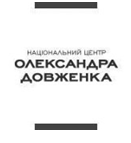
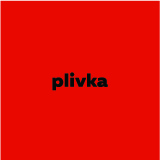
Visual Culture Research Center (VCRC) was founded in 2008 as a platform for collaboration between academic, artistic, and activist communities. VCRC is an independent initiative, which is engaged in publishing, artistic activities, research, organization of public lectures, discussions, and conferences. In 2015 Visual Culture Research Center received the European Cultural Foundation’s Princess Margriet Award. Visual Culture Research Center was also an organizer of The School of Kyiv – Kyiv Biennial 2015.
Visual Culture Research Center (44 Hlybochytska Street, 1 floor)
Contacts:
+380676695457 Ganna Tsyba
+380639535143 Natalka Neshevets
www.facebook.com/vcrc.org.ua
vcrc@vcrc.org.ua
Exhibition by Melnychuk-Burlaka Group. BETTER, WORSE, EVEN WORSE
February 26 – March 27, 2016
Exhibition by Melnychuk-Burlaka Group
BETTER, WORSE, EVEN WORSE
Visual Culture Research Center and Political Critique invite you to the Better, Worse, Even Worse exhibition by Melnychuk-Burlaka Group, which will open on February 26, at 19:00 and will last until March 27.
In Better, Worse, Even Worse project Ivan Melnychuk and Oleksandr Burlaka use key notions from architecture and urban studies for the interpretation of current political and military affairs. For example, how could it happen that in a political vocabulary the notion of “bridge” started referring to “friendship”, “unity”, “agreement”? After all, from the perspective of architectural history, bridge is, above all, a military tool serving for the expansion to new territories and establishment of effective control over them. The starting point for the project is a current propagandist project of constructing a bridge over Kerch Strait, which has to link occupied Crimea with Russian Federation.
The project is based on a work made for the exhibition Phone Calls from the Cemetery and Other Stories: An Exhibition Against the Covert War in Ukraine at the Academy of the Arts of the World, Cologne (curators – Ekaterina Degot and David Riff).
“The idea of linking two points on the straight line is the realization of mathematical abstraction. The main function of the bridge has been the same – to give war prisoners a work. The following promise of economic miracle is driven by the imitation of a sacrifice. Contemporary super bridges are enormous altars over the sea of blood.”
“The bridge over our heads links Russia with Europe. It is the bridge between two “welfares”. Countries in between are understood by Europe and Russia as dressings supplementing main course.”
Melnychuk-Burlaka Group
The exhibition is open daily from 13:00 to 20:00, Monday – closed.
Admission is free
Melnychuk-Burlaka Group was founded in 2013 (earlier Ivan Melnychuk and Oleksandr Burlaka were members of the Group of Objects). In their practice they question the role, ideology, and responsibility of an architect today. Melnychuk-Burlaka Group participated in the First Bergen Triennial (Bergen Assembly), in the exhibitions of PinchukArtCentre Art Prize nominees in 2013 and 2015, in the exhibition Phone Calls from the Cemetery and Other Stories at the Academy of the Arts of the World, Cologne etc. In 2014 the Island exhibition by Melnychuk-Burlaka Group took place at Visual Culture Research Center.
Oleksandr Burlaka is an architect and artist based in Kyiv, Ukraine. He is a Junior Research Fellow at the National Art Museum of Ukraine.
Ivan Melnychuk is an architect and artist based in Kyiv, Ukraine. He is a co-founder of Method foundation.
Supported by ERSTE Stiftung та Charles Stewart Mott Foundation:


Visual Culture Research Center (VCRC) was founded in 2008 as a platform for collaboration between academic, artistic, and activist communities. VCRC is an independent initiative, which is engaged in publishing, artistic activities, research, organization of public lectures, discussions, and conferences. In 2015 Visual Culture Research Center received the European Cultural Foundation’s Princess Margriet Award. Visual Culture Research Center was also an organizer of The School of Kyiv – Kyiv Biennial 2015.
Visual Culture Research Center (44 Hlybochytska Street, 1 floor)
Contacts:
+380676695457 Ganna Tsyba
+380639535143 Natalka Neshevets
www.facebook.com/vcrc.org.ua
vcrc@vcrc.org.ua
WAR IN KYIV. FILM SCREENING
Friday, 19 February 2016, 19:00
Film screening
WAR IN KYIV
Visual Culture Research Center and Political Critique invite you to the premiere screening of a collective film War in Kyiv, created during Kyiv Biennial 2015 within the framework of The School of Image and Evidence.
War in Kyiv is an experimental film shot during Artur Żmijewski’s workshop that took place at The School of Kyiv biennial in September 2015. The workshop was held in the form of a ‚conversation‘ between the participants that proceeded through short video statements. Every video created within the workshop was either an individual sentence, or a respond to other participant’s sentence. War in Kyiv is a collection of such statements, combined into a collective talk.
Co-authors of War in Kyiv: Vitaliy Atanasov, Angelina Kariakina, Ksenia Marchenko, Diana Poladova, Oleksiy Radynski, Ivanna Yakovyna, Artur Żmijewski.
A discussion moderated by Kateryna Sergatskova with participation of film co-authors will take place after the screening.
Artur Żmijewski is a filmmaker, artist, artistic editor of Political Critique project. He curated the 7th Berlin Biennial in 2012. In 2005 he represented Poland at Venice Biennial. His solo exhibition Democracies took place at Visual Culture Research Center in 2012.
Admission is free
Supported by ERSTE Stiftung та Charles Stewart Mott Foundation:


Visual Culture Research Center (VCRC) was founded in 2008 as a platform for collaboration between academic, artistic, and activist communities. VCRC is an independent initiative, which is engaged in publishing, artistic activities, research, organization of public lectures, discussions, and conferences. In 2015 Visual Culture Research Center received the European Cultural Foundation’s Princess Margriet Award. Visual Culture Research Center was also an organizer of The School of Kyiv – Kyiv Biennial 2015.
Visual Culture Research Center (44 Hlybochytska Street, 1 floor)
Contacts:
+380676695457 Ganna Tsyba
+380639535143 Natalka Neshevets
www.facebook.com/vcrc.org.ua
vcrc@vcrc.org.ua
The Violence of the Image. Lecture by Lesia Kulchynska
Wednesday, 17 February 2016, 19:00
Lecture by Lesia Kulchynska
The Violence of the Image
Visual Culture Research Center and Political Critique invite you to the lecture by Lesia Kulchynska, that will take place on Wednesday, 17 February, at 19:00.
The most terrifying thing about horror films is that the horror haunts us even after the end of the movie. Why does screen, that separates us from the horrible, appears to be penetrable for fear? Why do we feel helpless before the image, even if we are physically safe? In order to protect ourselves, we have to close our eyes. But even this does not always help. Some images are so dangerous that they have to be destroyed. Why do people fight with images? How can “just an image” be threatening? What exactly is under threat? Is fear of the image an attribute of naïve consciousness, or is there actually something to be afraid of?
Lesia Kulchynska, PhD, is a curator, cultural and film theorist at Visual Culture Research Center.
The lecture will open a new season at Visual Culture Research Center, which is a conceptual continuation of ideas, practices and projects, initiated by The School of Kyiv – Kyiv Biennial 2015.
Admission is free
Photo: Olivia Steele. Nothing Is What It Seems, 2014.
Supported by ERSTE Stiftung та Charles Stewart Mott Foundation:


Visual Culture Research Center (VCRC) was founded in 2008 as a platform for collaboration between academic, artistic, and activist communities. VCRC is an independent initiative, which is engaged in publishing, artistic activities, research, organization of public lectures, discussions, and conferences. In 2015 Visual Culture Research Center received the European Cultural Foundation’s Princess Margriet Award. Visual Culture Research Center was also an organizer of The School of Kyiv – Kyiv Biennial 2015.
Visual Culture Research Center (44 Hlybochytska Street, 1 floor)
Contacts:
+380676695457 Ganna Tsyba
+380639535143 Natalka Neshevets
www.facebook.com/vcrc.org.ua
vcrc@vcrc.org.ua
Lecture by Jérémie Gauthier
Thursday, 17 December 2015, 19:00
Ethnography of Police Intrusion Practices in High Security Areas (“Sensitive” Neighborhoods) in France
Lecture by Jérémie Gauthier is based on a long term ethnographic inquiry of public security actors (police, municipality, judicial bodies) in one big French city. It strives to reconceptualize the relationship between police actions and political power. The lecturer will present strategies, chosen by the police in accordance with requirements of central authorities, through the example of the so-called Top-Priority Security Zones Reform, which is being implemented in France since 2012, and is aimed at “territorialization” of police activities by concentrating their forces in so-called sensitive areas. He will also analyze the division of power between different institutions involved in implementation of local security policies, as well as impact such reforms have on the relationship between police and residents of these “sensitive” neighborhoods.
Jérémie Gauthier is a sociologist who works at the Institute for the Interdisciplinary Research of Social Problems (IRIS-EHESS) in Paris and in Marc Bloch Franco-German Research Centre for the Social Sciences in Berlin. His research is mainly focused on the questions of police activities in France and Germany: the relationship between police and minorities, discrimination and racism on the part of police, gender dimension in the work of police, social security reform, as well as correlations of police’s rights and actions. Lately, Jérémie Gauthier has been working on the research of state policy implementation methods on the local level in France and Germany.
The lecture will take place within The School of the Displaced of The School of Kyiv – Kyiv Biennial 2015 and the frameworks of Migrations, Identities, Territories program, which is developed by the French Institute in Ukraine and presents French experience in migration research from historical, sociological, and demographical perspectives.
Working language – French, with consecutive interpretation into Ukrainian
Admission is free
Supported by ERSTE Stiftung and Charles Stewart Mott Foundation


Contacts:
+38096 4929600 (Nataliya Neshevets)
www.facebook.com/vcrc.org.ua
vcrc@vcrc.org.ua
Program of Events within “What in Me Is Feminine?” Exhibition
November 19, Thursday
19:00
Opening of “What in Me Is Feminine?” Exhibition
November 20, Friday
19:00
Zuzanna Janin. In Between. About the Moment and Memory.
The artist will talk about the main topics of her works such as fragility of a human and his or her conditions of existence, memory, space, and time. She will show her video In Between (2006).
20:00
Anka Lesniak. Visible and inVisible. Feminist Art in Public Space.
The artist will show photo and video documentations of her projects that are aimed at the specificity of a site, where they take place.
Working language – English
November 21, Saturday
17:00
Alicja Zebrowska. Psycho-Penetration
The artist will focus on her artistic fascination with a human soul (psyche) and experiments with interactions between people. She will show her videos Insides, Desinfection of feelings, Infiltron, Regression, Monitoring.
18:00
Anna Baumgart. How the Trained Girls Make Love Movies
A human as a political animal is a human that has a voice to avoid invisibility. The artist will show her films: Ecstatic, Hysterical and Other Saintly Ladies, Supplement to the Piece on Mother and Motherland, and The Cranes Are Flying.
19:00
Aleka Polis. Сyclooxytocin
The artist will show the work Oxytocin # 44 about her gift for Ukraine during Maidan and also videos Muslim Rosary, After three days I will have four holes, Hylogenia.
Working language – Polish with translation
November 22, Sunday
16:00
Oksana Briukhovetska. A curator-led tour of «What in me is feminine?» exhibition
November 29, Sunday
17:00
Iwona Demko. A Forgotten Vagina Cult
The artist will give a lecture about the divine and sacred status of vagina in pre-patriarchy because of its ability to give life, and how later the vagina has been fraught with guilt and shame.
Working language – Polish with translation
December 5, Saturday
17:00
Alina Yakubenko. How It Used to Be, video (2015)
The video is comprised of anonymous interviews in which artists talk about reluctant work to earn money and the hidden side of the artists’ labor market, which generates a product called “hackwork” (“khaltura”).
December 18, Friday
19:00
Discussion Sex Work: to Allow or to Ban
The public discussion is aimed to debunk popular myths about sex work by the up-to-date research in social sciences. The reasons that motivate women to become sex workers and existing practices to regulate sex work will be at the focus of the discussion.
Participants of the discussion:
Natalia Isaieva, a spokeswoman for Legalife-Ukraine charity organization
Olena Zuckerman, an executive director of Legalife-Ukraine charity organization
Anna Dovgopol, a feminist
Moderated by Dafna Rachok.
December 21, Monday
19:00
Oksana Briukhovetska. A curator-led tour of «What in me is feminine?» exhibition
Closing of the exhibition
Supported by ERSTE Stiftung and Charles Stewart Mott Foundation


Project cofinanced by the Ministry of Culture and National Heritage of the Republic of Poland

Organization partners: Krytyka Polityczna and Polish Institute in Kyiv


Contacts:
www.facebook.com/vcrc.org.ua
vcrc@vcrc.org.ua
Tetiana Mala
093 168 38 62
mala.socio@gmail.com
Anna Orekhova
050 918 65 37
a.orekhova@gmail.com
The School of Kyiv – Kyiv Biennial 2015
The School of Kyiv – Kyiv Biennial 2015 presents a new format of an art biennial integrating exhibitions and arenas of public reflection. Works of more than 100 international and Ukrainian artists will be shown in an open display structure, including six Schools, where artists and intellectuals from around the world will meet and work with the public in collaborative forums. Departing from the current situation in Ukraine, the “The School of Kyiv” will be addressing burning issues relevant for the citizens of Ukraine, Europe and beyond as well as imagining egalitarian and alternative futures; and the counter-propositions of art.
The School of Kyiv is an independent project curated by Hedwig Saxenhuber and Georg Schöllhammer, and conceived and organized together with the Visual Culture Research Center (Kyiv).
Departments of “The School of Kyiv” will open in a series of institutions across Europe as an integral part of the project.
Presentation of the publishing project “POLITICAL PROPAGANDA”
Friday, 5 June 2015, 19:00
Visual Culture Research Center (44 Hlybochytska Street (1st floor), Kyiv)
Visual Culture Research Center and Political Critique invite you to the presentation of publishing project “POLITICAL PROPAGANDA”, which will take place on Friday, 5 June, at 19:00.
Oksana Shalygina, Petr Pavlensky and Viktoria Bavykina will present the “POLITICAL PROPAGANDA” publishing house. “POLITICAL PROPAGANDA” is an independent information platform, which covers problems of contemporary art in political context. Particular attention will be drawn to the latest issue of the same-name magazine. “This issue tells the brutal story of victim production plant. Sexual exploitation, free labour, and funding of their possessors is something that the victims are forced to do in the process of reworking”. – PP. The “plant” example and personal life experience will help the editors to explain why is personal always political.
Oksana Shalygina is a publisher and editor-in chief of “POLITICAL PROPAGANDA” publishing house. Petr Pavlensky is an artist. Viktoria Bavykina is a head of “POLITICAL PROPAGANDA” publishing house.
The lecture will take place at Visual Culture Research Center within the frameworks of the exhibition “Some Say You Can Find Happiness There” and “Exploitation of the Imaginary” project (May 20 – June 15, 2015).
Admission is free
The project is supported by Rosa Luxemburg Stiftung
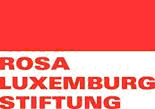
Supported by ERSTE Stiftung and Charles Stewart Mott Foundation


Visual Culture Research Center (VCRC) was founded in 2008 as a platform for collaboration between academic, artistic, and activist communities. VCRC is an independent initiative, which is engaged in publishing and artistic activities, scientific research, organization of public lectures, discussions, and conferences. In 2015 Visual Culture Research Center received the European Cultural Foundation’s Princess Margriet Award.
Visual Culture Research Center (44 Hlybochytska Street (1st floor), Kyiv)
Contacts:
+38096 4929600 (Nataliya Neshevets)
www.facebook.com/vcrc.org.ua
vcrc@vcrc.org.ua

